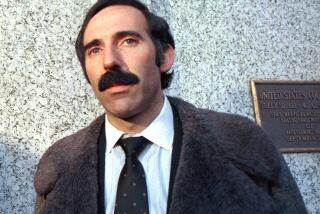U.S. May Be Dragging Feet on New BCCI Indictment : Scandal: Twenty months after the bank was told it would be charged in a coffee-smuggling case, no action has been taken by the Justice Department.
- Share via
WASHINGTON — In February, 1990, Bank of Credit & Commerce International officials were told by federal authorities that the bank would be indicted within four to eight weeks for its role in a scheme to evade taxes from coffee smuggling, according to internal bank documents.
Already damaged by the guilty plea it had entered to money-laundering charges a month before, BCCI officials feared that the new criminal indictment would have “dreadful” consequences with regulators and customers worldwide. The documents show that they were especially worried about the timing of the charges.
Twenty months later, BCCI still has not been charged in the coffee-smuggling case, and two sources close to the investigation say Internal Revenue Service agents involved in the inquiry in Miami are frustrated by what they regard as delays caused by the Justice Department in Washington.
The absence of an indictment after the clear warning that one was imminent raises new questions about whether the government has been too slow to investigate BCCI’s activities in the United States. An IRS spokesman said the agency could not comment on the coffee-smuggling investigation, and the Justice Department official overseeing BCCI matters would not discuss the status of the investigation. But he strongly denied that there had been interference in the inquiry, saying tax cases are especially complex and time-consuming.
“Agents in the field always want to move faster,” said Robert S. Mueller III, the assistant attorney general coordinating federal investigations of BCCI in Atlanta, Miami, Tampa and Washington. “Do not assume that because we have not indicted that a decision has been made not to indict. That’s not to say there will be one.”
BCCI was seized by regulators in several countries last July 5, including the United States and Britain. The regulators acted after uncovering evidence of widespread fraud and massive losses at the once-powerful international bank.
In January, 1990, the bank had pleaded guilty to federal money-laundering charges in Tampa, Fla. BCCI had succeeded in persuading regulators and major customers that the laundering represented isolated acts by a few employees. As a result, bank officials became worried a month later about the impact of a second set of criminal charges.
“We have been so focused and tension-ridden about the possibility of a further indictment that we have bestowed upon it the power to signal a catastrophe,” a top BCCI official in New York wrote to the bank’s president, Swaleh Naqvi, the day after learning from IRS agents of the imminent indictment.
In hopes of persuading prosecutors not to bring the charges, BCCI hired a private investigations firm, Philip Manuel Resource Group, to examine its role in the tax-evasion and coffee operation.
The resulting report, which was completed in November, 1990, and obtained recently by The Times, concluded that the bank was vulnerable to indictment. A former BCCI employee said the report increased concerns among bank officials that the bank would be indicted.
According to court records and the 216-page report, BCCI offices in Miami and Boca Raton, Fla., were used extensively between 1983 and 1988 in a scheme to evade U.S. taxes on profits in a multimillion-dollar coffee-smuggling scheme.
The alleged mastermind of the scheme was Munther Bilbeisi, a Jordanian businessman who ran several firms in Boca Raton, according to the report.
BCCI provided Bilbeisi with letters of credit and cashier’s checks “opening the door to allegations of (BCCI) complicity in money-laundering and income tax evasion by Bilbeisi and his companies,” according to the report.
Bilbeisi and his accountant were indicted in Miami last August on tax-evasion charges stemming from the alleged scheme. Bilbeisi is reportedly in Jordan, and an attempt to reach his attorney in Florida was unsuccessful.
In addition to assisting Bilbeisi, a BCCI officer in London opened numbered accounts for three of his associates who said they did not want their money in U.S. banks because of “tax consequences,” said the report. Between 1984 and 1988, the accounts earned $600,000 in interest and millions of dollars passed through them, said the report.
“From the point of view of a prosecutor, there may be ample evidence to circumstantially indicate that the bank, through its employees . . . engaged in a conspiracy . . . to defraud the United States,” the report concluded.
Times staff writer Robert L. Jackson in Miami contributed to this report.
More to Read
Sign up for Essential California
The most important California stories and recommendations in your inbox every morning.
You may occasionally receive promotional content from the Los Angeles Times.













